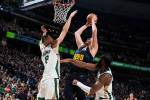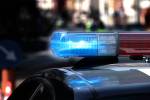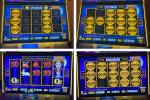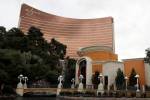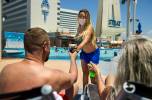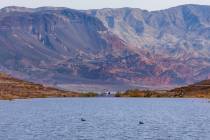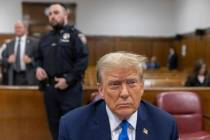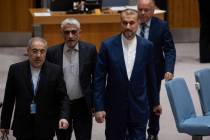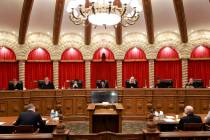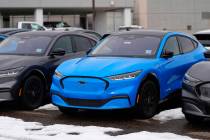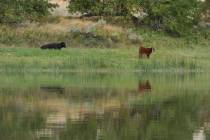Voters for pullout
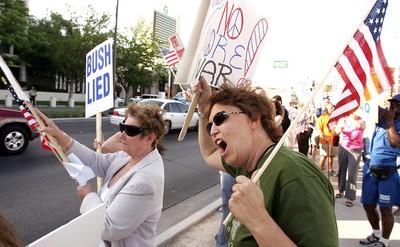
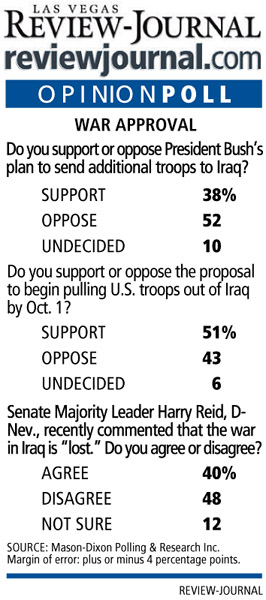
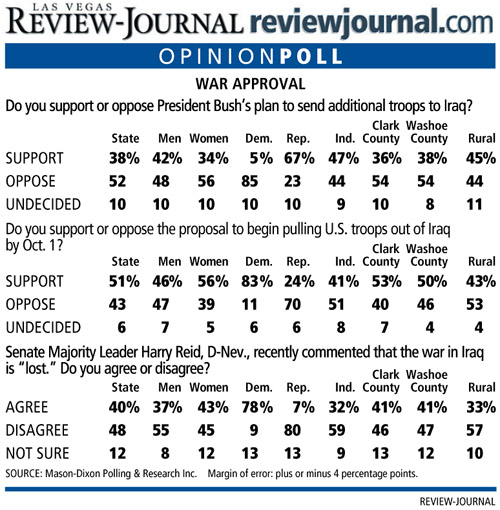
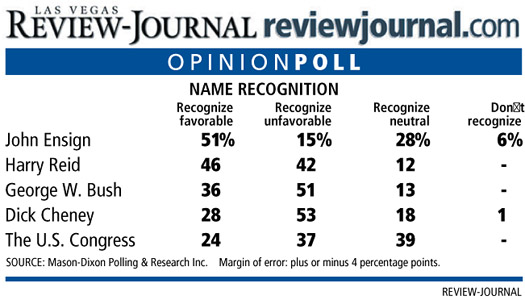
Nevada voters oppose President Bush’s policy in Iraq and support a pullout of U.S. troops, albeit by narrow margins, according to a Review-Journal poll.
The poll of 625 registered voters statewide found 52 percent were opposed to Bush’s plan to send additional troops to Iraq; 38 percent supported the idea, and 10 percent were undecided.
Meanwhile, 51 percent of those surveyed said they supported the proposal to start pulling U.S. troops out of Iraq by Oct. 1, while 43 percent were opposed and 6 percent were undecided.
The poll, conducted Monday and Tuesday by Washington, D.C.-based Mason-Dixon Polling & Research Inc., has a margin of error of plus or minus 4 percentage points.
"It’s pretty clear that sentiment has shifted against the war, in Nevada," pollster Brad Coker said. "A slight majority is against President Bush, and a slight majority support starting to pull out in the fall. This is pretty consistent with what’s going on nationally."
But voters were not ready to go as far as Senate Majority Leader Harry Reid, D-Nev., who said recently that the war "is lost." Forty-eight percent of those polled disagreed with Reid’s comment, 40 percent agreed, and 12 percent said they weren’t sure.
"People aren’t quite ready to throw in the towel," Coker said.
Coker said that on the war questions, Democrats were largely unified, while Republicans had drifted from the president somewhat.
Among the Democrats polled, 85 percent opposed the troop increase, and 83 percent supported a pullout; 78 percent agreed with Reid’s "lost" assessment.
Although 80 percent of Republicans disagreed with Reid’s remark, only 67 percent of Republicans supported Bush’s troop increase, while 24 percent supported the pullout proposal.
"You’re seeing a softening among Republicans toward the president," Coker said. "Voters are very starkly divided, and independents are split down the middle. The percentage of Republicans opposing the president is what flips the numbers" into the anti-Bush column, he said.
If anything, he said, independents leaned slightly toward Bush. They were nearly tied on the troop increase, with 47 percent supporting and 44 percent opposed, and against the pullout proposal by 51 percent to 41 percent.
"Independents are very torn, apparently, in Nevada," said national pundit Larry Sabato, director of the Center for Politics at the University of Virginia. "Among independents nationally, it’s about 60-40 against" the current course of the war in Iraq.
"Most Americans are extremely frustrated and increasingly pessimistic about the war," Sabato said. "They’re not ready to completely write it off, but the fulcrum has shifted. Two years ago, three years ago, most Americans were supportive and believed the war in Iraq was going to end well. Now most people are not supportive and believe it is going to end badly."
The poll tested Nevadans’ view of Bush. Asked whether they saw him favorably, unfavorably or in a neutral light, 36 percent said favorable, 51 percent unfavorable and 13 percent were neutral.
In a nationwide poll conducted for NBC News and The Wall Street Journal in late April, 36 percent viewed Bush very or somewhat positively, 51 percent saw him very or somewhat negatively, and 13 percent were neutral.
Bush’s numbers have slipped since the previous time the Review-Journal asked about him, in September 2006, when he was seen favorably by 41 percent and seen unfavorably by 49 percent.
In the new poll, Vice President Dick Cheney fared worse than Bush, with 28 percent seeing him favorably, 53 percent unfavorably. That is par for the course nationally, Coker said.
Bush and Cheney’s numbers, he said, "are purely driven by the Iraq war, plain and simple. This is all about Iraq. Voters are very focused on the war."
Nevada voters took a dim view of the U.S. Congress: 24 percent viewed the legislative branch favorably, while 37 percent had an unfavorable view and 39 percent were neutral. Coker said that, too, is typical and not a reflection of the Democratic takeover in November’s elections.
"Congress as an institution almost always rates very low, whether it’s a Democratic Congress or a Republican Congress, but individual members always rate higher," he said. "People think it’s not their representative, it’s all the other idiots."
Reid’s numbers have improved slightly since last year but still put him into the under-50-percent danger zone. He was viewed favorably by 46 percent of Nevada voters, unfavorably by 42 percent. In September, the split was 43 percent favorable, 39 percent unfavorable.
Reid continues to suffer among his constituents for his party leader role, Coker said. His support was once strong across party lines, "but then he took up the party leadership and became a lightning rod." Reid became Senate minority leader in 2004 and majority leader in November.
Reid spokesman Jon Summers said the numbers represented "an improvement over the last poll." The answers to the war questions, he said, demonstrate that "the majority of Nevadans stand with Senator Reid and his efforts to change course in Iraq."
Nevada’s junior senator, Republican John Ensign, fared better. Despite voters’ opposition to a war policy and president that Ensign supports, Ensign was viewed favorably by 51 percent of those surveyed, unfavorably by 15 percent and neutrally by 28 percent.
Ensign’s support was down a bit from September, when 56 percent saw him favorably, 17 percent unfavorably. But he continues to do a good job of remaining popular with his constituents, Coker said.
"Ensign’s been successful at keeping himself aligned with Nevada issues," Coker said. "He’s doing what Harry Reid used to be able to do."
Review-Journal Polls


